
When the best collegiate athletes in the United States gather for the 2024 NCAA Ski Championships, they will head to the nation’s oldest ski area, Howelsen Hill, for one of the longest continuously run championship events in the country. The NCAA is the most staid competitive circuit in US Skiing history, and continues to serve as an incubator of North American ski-talent. The best young skiers in the country will be racing in Steamboat Springs this week. Yet, in 2024, they are competing at a 70 year old championship that seems oddly behind the times.
The out-of-sync quality of NCAA skiing is defined by two facts of life at the Championships:
(1) Combined nordic and alpine team scoring—crowning a National Champion uses combined totals from nordic and alpine racing (even long after the idea of crowning a “ski-meister” has been left far behind).
(2) No Sprint racing—the 2024 NCAA Championship will consist of a 7.5 k skate individual start on Thursday, and 20 k Classic Mass Start on Saturday. That format leaves many of the country’s best sprinters without a shot to compete for a collegiate championship despite their discipline’s established importance at senior levels of the sport.
In an odd way, the stubbornness of the NCAA to change has slid into a really healthy spot as the nature of the college field changes. In the not-too-distant past, young American skiers with international potential would forego college skiing altogether; now, the Stifel U.S. Ski Team has begun embracing the training resources and financial backing that college teams provide. As a result, more skiers at the NCAA Championships than ever before are tied to national ski programs—primarily the United States and Canada—and the fields at the Championships have grown increasingly competitive.
In turn, the NCAA Championships have also shrunk from being the be-all and end-all of the college skiing experience. A quick glance at the 2024 US Cross-Country National Championships results shows that it has become a kind of de-facto open college event with pro teams and promising junior skiers mixed in, offering a championship-level race in the middle of the season, rather than at the traditional conclusion…and with sprint races too! In the interim between US Nationals and NCAAs, college skiers are expanding far beyond their NCAA circuits as well. Nearly every skier representing the USA at World U23/Junior Ski Championships this year came from a college program, or will be joining one in the near future. Expanded American and Canadian rosters at World Cups in North America (Canmore and Minneapolis) leaned particularly heavily on college athletes. Canadian and American college athletes didn’t waste those World Cup opportunities, skiing to multiple top 30 finishes.
So, what exactly is this NCAA Championships in Steamboat Springs this week? Well, it’s always been about the skiers competing, and the ways they’ve helped to define what NCAAs are, and are not. Out amid the forecasted light snow—on a course that climbs, climbs, climbs some more, and then punches with a series of fast, fun downhills—will be skiers concluding a long season. With the idiosyncrasies in the NCAA championship format, this won’t be a definitive conclusion. Most of these skiers have found that elsewhere, anyway. Regardless, NCAAs will be a celebration,as skiers join up with a grand old tradition uniquely woven within other threads of American life—growing up, and growing alongside teammates and competitors through competition, in that old rite of passage that is the college experience.
Watch the 2024 NCAA Ski Championships HERE
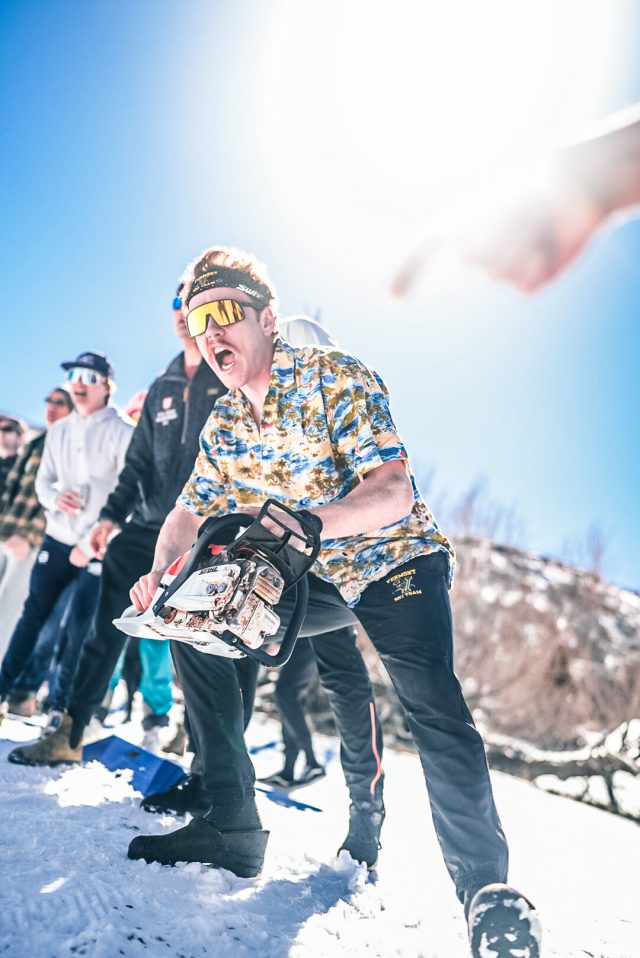
Women’s Field—Eastern Skiers Challenge Utah’s Dominance
Full 2024 NCAA Field Announced HERE
Last year’s NCAA Championships in Lake Placid saw a clean sweep from University of Utah’s Novie McCabe in the 5 k Freestyle and 20 k Classic race. McCabe has since graduated and moved to join the Alaska Pacific University Nordic Center (APU) program, but her wins perpetuated a trend that has a good chance to continue in 2024—the University of Utah winning the Women’s NCAA Championships. 2020 was the last time a UU skier didn’t take the top step in the Women’s race when Finnish skier Evelinna Piipo took the win for the University of Denver (the second race at that year’s NCAA Championship was canceled due to the COVID-19 pandemic). Since then, Sydney Palmer-Leger swept 2021 NCAAs at Jackson, New Hampshire, before McCabe claimed her first NCAA title at Soldier Hollow in 2022 in the 5 k Classic, and then finished second to her teammate Sophia Laukli who took that year’s 20 k Freestyle win.

McCabe and Laukli have since graduated, leaving Palmer-Leger the only current champion in this week’s field. Palmer-Leger is still a contender in nearly every race she starts, and has proven so throughout the Rocky Mountain Interscholastic Ski Association (RMISA) season. She’ll be joined for UU by Norwegian Karianne Dengerud who, earlier this year, won the US Nationals Freestyle Sprint at Soldier Hollow, and has been a consistent presence in the top ten throughout the season in the West. Rounding out the UU squad will be freshman Nina Schamberger who brings more experience to the Howelsen course than any typical first-year. Schamberger grew up in nearby Leadville, Colorado. Despite battling a back injury this season, has shown her potential to ski with nearly anyone in the field when she’s healthy.
Beyond the UU squad, the Western region will also bring Montana State’s Tilde Baangman as a top contender. The Swedish-born Baangman burst out of the gate this season, taking a surprise win in the 10 k Classic at US Nationals. She has won numerous Western region races this season, and enters the championship weekend as half of a strong duo from the Montana State Bobcats alongside teammate Kate Oldham. A Junior, Oldham will be making her first NCAA experience; like Schamberger, Oldham brings plenty of experience racing in Steamboat having grown up in Carbondale, Colorado skiing with Aspen Valley Ski and Snowboard Club.
Other skiers to watch from the Western contingent include the University of Colorado duo of Hanna Abrahamsson (who finished runner-up in last year’s 20 k classic in Lake Placid )and Anna-Maria Dietze (who won the NCAA 7.5 k skate race that was held earlier this year on the Howelsen Hill course). The University of Alaska-Fairbanks will also field the persistently strong pair of Mariel Pulles and Kendall Kramer. Pulles finished top 10 in both of last year’s NCAA Championship races, while Kendall Kramer has had a season highlighted by a second place in a close-fought 20 k Freestyle race at US Nationals, World Cup starts in Minneapolis where she took 36th place in the 10 k skate, and a win earlier this year in the 10 k Classic at the University of Utah invitational.
At last year’s NCAAs, the top performer emerging from the Eastern Interscholastic Ski Association (EISA) Carnival circuit was the University of New Hampshire’s Jasmine Lyons, who took second in the 5 k Freestyle race. Lyons, though, is not participating in this year’s NCAA Championships, and without her presence, the East won’t have a skier on the start line in Steamboat Springs with a prior top five finish in an NCAA Championship race; however, that shouldn’t serve to diminish the Eastern region’s potential. At national and international-level racing this season, skiers from Dartmouth, the University of Vermont, Bowdoin, and Middlebury have scored historic results for college and country, and often done so in the same fields as their Western Region counterparts. The stand-outs in that respect are two skiers: UVM’s Haley Brewster, and Dartmouth’s Ava Thurston.
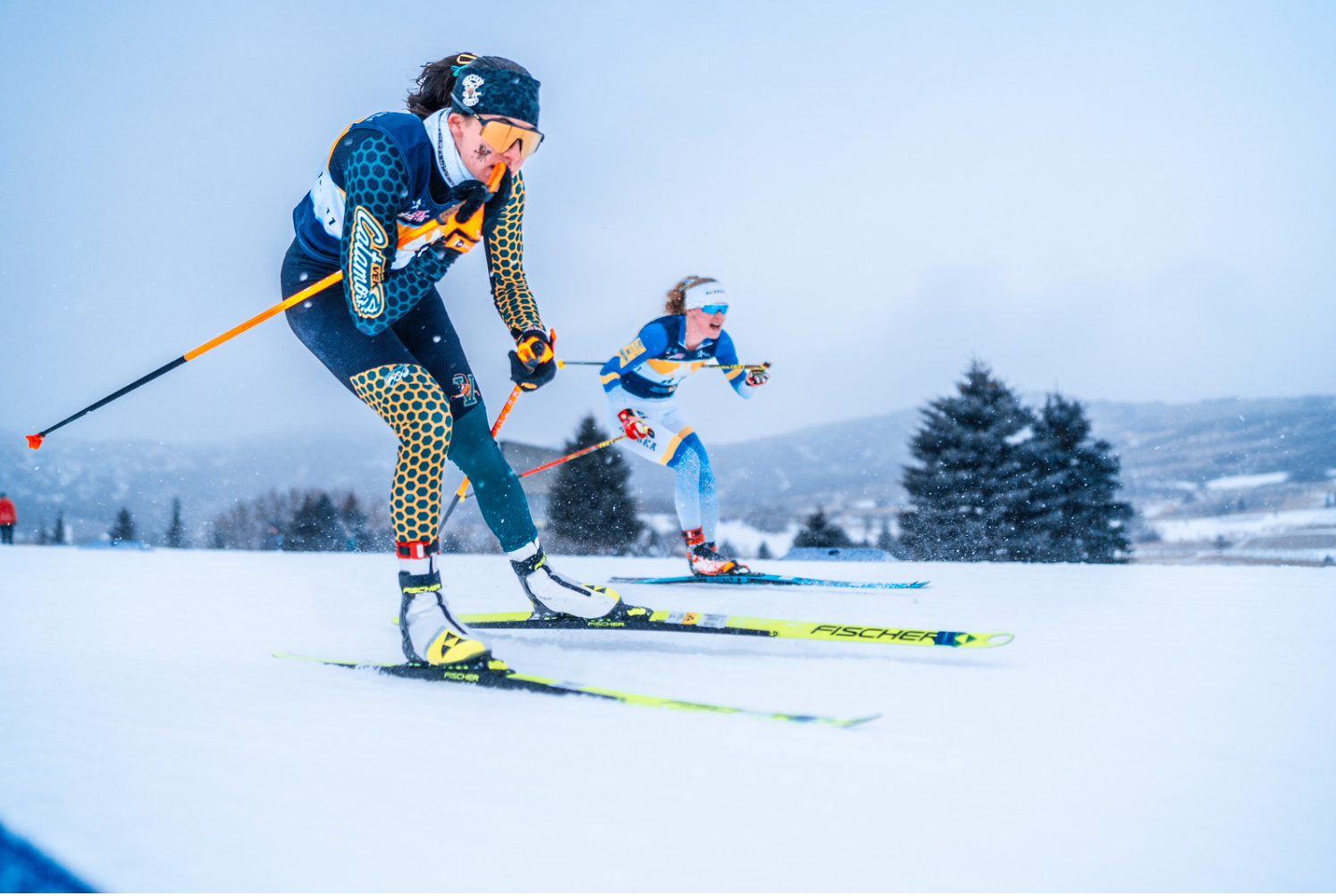
Brewster has experienced a whirlwind of successes this season, starting with her first National Championship win in the 20 k Freestyle Mass Start in January. A trio of Eastern Carnival wins started off her collegiate season before she traveled to Planica, Slovenia to compete for the US at U23 World Ski Championships. There, she and Novie McCabe featured in the lead pack of the 20 k Freestyle Mass Start. Brewster pushed the final kilometer to take a U23 World Championship silver medal, highlighting a week for her in which she never finished outside the top 15 across all competitions. Her success translated to the senior World Cup circuit a week later in Minneapolis where she scored her first World Cup points by taking 25th in the 10 k Freestyle. A Junior at UVM, she has yet to finish in the top ten at an NCAAs race in her career, but with a resume that’s been completely re-written in recent months, the former Ski and Snowboard Club of Vail skier will be considered a favorite in Steamboat Springs.
Ava Thurston follows Brewster in a similar vein. In the EISA Carnival field this year, Thurston has been reliably near the top of the field, and is coming off of winning the 20 k Classic at the Middlebury Carnival Regional Championships. The Dartmouth sophomore has also had a frenetic couple of months, highlighted by a consistently strong week at Junior World Ski Championships where she finished seventh in the 20 k Freestyle Mass Start, and then a Minneapolis Sprint qualifier where she finished just a second off the heats in 40th place. Thurston placed 10th in the 5 k Freestyle and seventh in the 20 k Classic at last year’s NCAAs. With a stellar season leading into this year’s championship, she will be a favorite to challenge closer to the podium. Alongside Thurston, the Dartmouth Ski Team will also field Jasmine Drolet who finished just behind Thurston in last year’s 20 k Classic, and Emma Reeder who makes her NCAA debut in Steamboat Springs.
The EISA sends an impressive degree of depth among its qualified racers. Among those standouts is Emma Crum who has featured in the top 10 consistently at Carnivals all season and leads a full contingent of Bowdoin Polar Bears to Steamboat Springs alongside Jordan Grialou and Morgan Richter. The University of New Hampshire, with a full team of Lucina Anderson, Hattie Barker, and Lea Stabaek Wenaas will also look to compete, while Middlebury’s Shea Brams has also proved a top distance classic skier, with a win most recently in a 15 k Classic Mass Start at the Dartmouth Carnival.
Rounding out the Women’s field is the Central Division, sending a contingent highlighted by Michigan Tech’s Anabel Needham. The Houghton, Michigan native previously took a podium at NCAAs in 2022’s 5 k Classic, and is coming off a season in which she posted consistently strong results at U23 World Ski Championships in Planica, Slovenia, and won the 7.5 k Freestyle race at Central regionals two weeks ago. Needham took third in that weekend’s 20 k Classic race, won by Merle Richter, who highlights the Northern Michigan University (NMU) team at NCAAs this year. Richter has shown particular prowess in the 20 k Classic, adding an earlier Central Region win at NMU’s home meet. She’ll likely add some Midwestern flair to the lead pack in the Steamboat Springs race, and represents a good chance for NMU to score its first Women’s NCAA Championship since 2007 when it swept the championships with Lindsay Williams and Lindsey Weier.
With an all-distance NCAAs program—and last year’s champion gone—the Women’s races will feature a bevy of competitors capable of winning on the right day. That’s a testament to the strength and depth of a field: Olympians, World Junior Championships medalists, and more will make the Steamboat Springs course a particularly interesting variable in determining who emerges as NCAA champion.
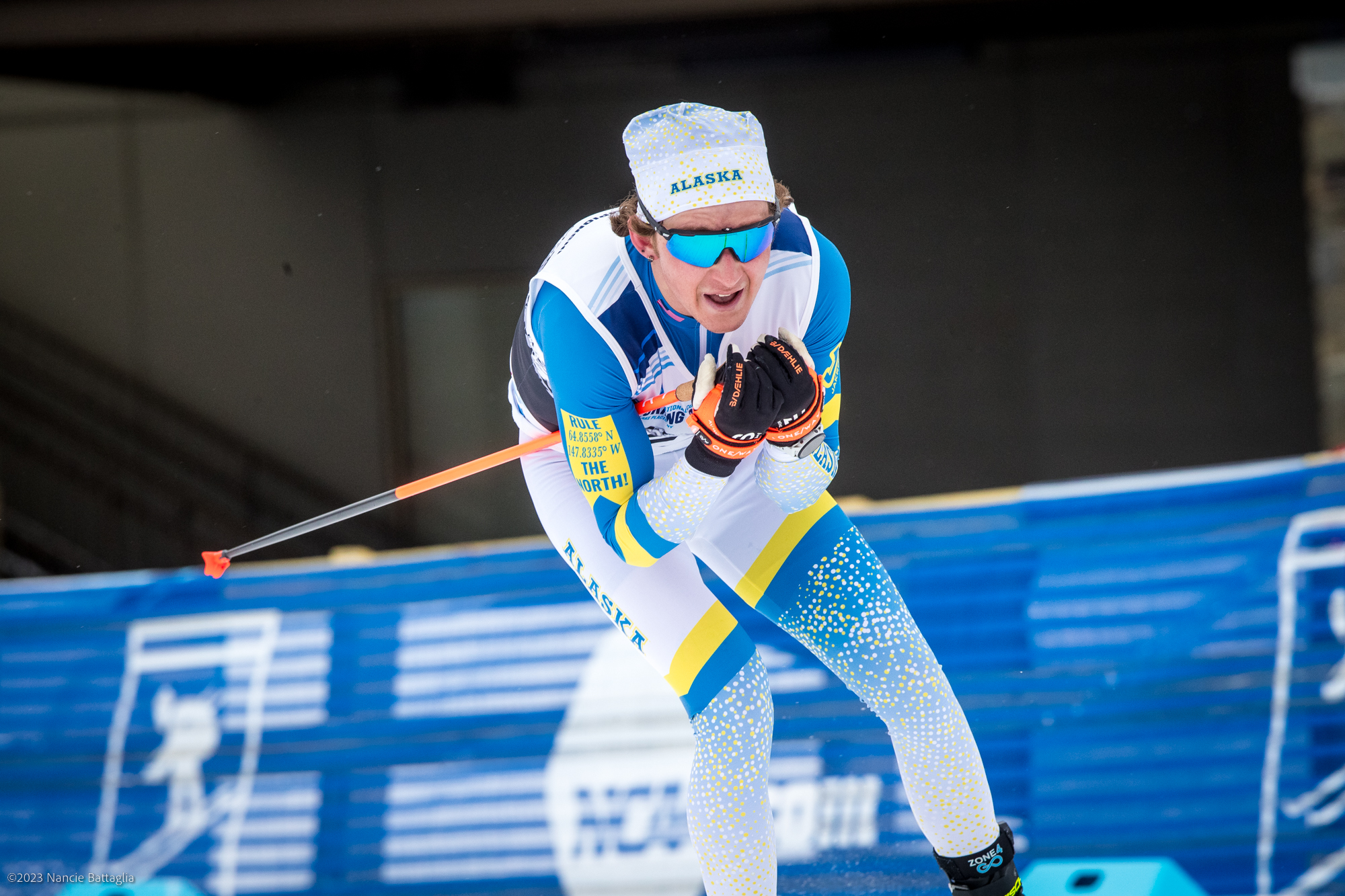
Men’s Field—Returning and Ascendent Champions in Steamboat
Full 2024 NCAA Field Announced HERE
In contrast to the Women’s field, the Men’s field in Steamboat Springs is deep with skiers who already have earned places on NCAA podiums. Both of last year’s NCAA champions will be looking to add to their collegiate accomplishments, and a select few who found the podium last year will be looking to capture the title of NCAA Champions.
First among the returning champions is 2023 Lake Placid 10 k Freestyle champion, Joe Davies. The British/Canadian University of Utah Junior won last year as a member of the University of Alaska-Fairbanks team. Davies has followed up his NCAA triumph with a season that’s shown his wide range of talents as a skier. At US Nationals in January, he skied to a pair of second place finishes in the week’s distance races. Davies also had a phenomenal performance at the Minneapolis World Cup where he finished 16th in the 10 k Freestyle for Great Britain. Davies is also coming off a win in the 7.5 k Freestyle at RMISA Regionals in Bozeman, indicating that he is poised to defend his NCAA skate title.
The other individual champion at last year’s NCAAs was Canadian Remi Drolet from Harvard University, who won the 2023 20 k Classic Mass Start. Drolet has followed that campaign with an EISA Carnival season in which he never finished off the podium lending credence to his versatility and continued presence at the front of the NCAA field. The nature of his win last season at Lake Placid—reeling back an attack by John Steel Hagenbuch late in the 20 k Classic Mass Start—will be an indicator of the Canadian’s experience and poise as he looks to add to his NCAA total in Steamboat Springs.
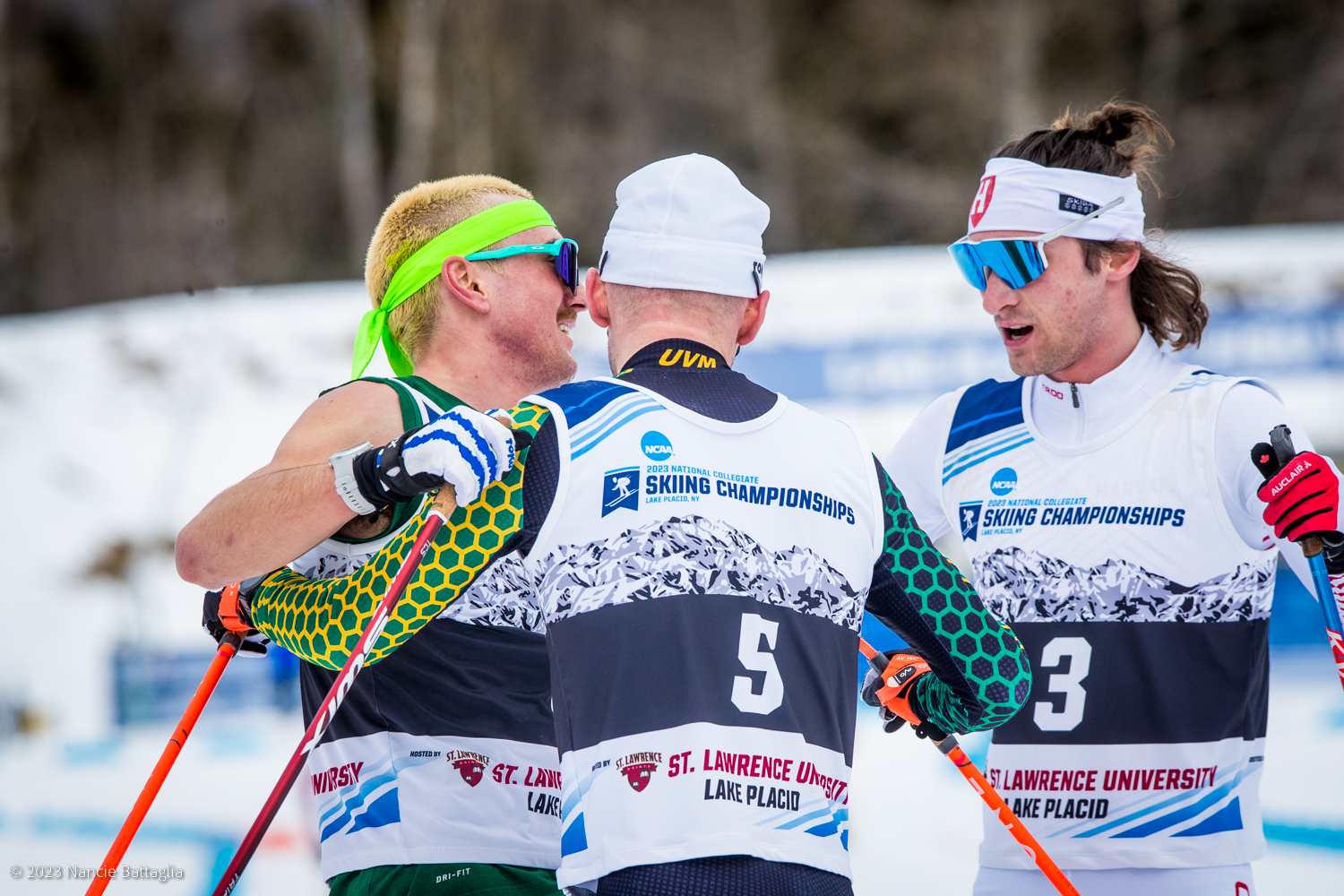
At the top of the list of contenders outside the defending champions will be Hagen buch, a Dartmouth junior who comes to Steamboat Springs with the clearest goal out of any other skier: pick up one place from last year. Hagenbuch was runner-up to both Davies in the 10 k Freestyle and Drolet in the 20 k Classic, and since has bolstered his credentials to be considered the all-out favorite in the Men’s field. Hagenbuch has won every collegiate race he has entered this season, a feat last completed by the University of Vermont’s Ben Ogden on his way to sweeping the 2022 NCAA Championships in Soldier Hollow. In December, Hagenbuch skied to a World Cup 13th place in Ostersund in a 10 k Freestyle race. Then, at US Nationals, he made a move 15 k into the 20 k Freestyle Mass Start that led to his winning by over a minute. He then proceeded to open up U23 World Junior Ski Championships with a bronze medal in the Freestyle Sprint, and rounded out his latest trip to the World Cup with a 30th place in the 10 k Freestyle at Minneapolis. National Champion, U23 World Championship medalist: NCAA Champion seems like the natural next title that Hagenbuch is looking to add to his resume. He’ll get his chance in Steamboat Springs.
There is another already-NCAA-champion, the University of Colorado’s Magnus Boee, who swept the Championships in 2021 at Jackson, New Hampshire. three years later, Boee has remained a persistent presence at the front of collegiate race fields. He most recently finished just 0.3 seconds behind Joe Davies in the RMISA 7.5 k Freestyle regional championship race in Bozeman. Boee will also benefit from skiing on his “home” course, as Colorado hosts the championships in Steamboat. That home-field advantage may also benefit the other Buffaloes NCAA qualifier, Will Koch, who found the podium in the 20 k Classic at Howelsen Hill earlier this season, and was a US Nationals winner in the Freestyle Sprint in January.
One more Colorado skier—this one from the University of Denver—will also come to Steamboat Springs in pursuit of an NCAA title. Andreas Kirkeng won the 10 k Classic race at US Nationals in January. Since then, has won every RMISA classic race excepting a 10 k Classic at the University of Utah Invitational. That run includes a pair of wins in 20 k Classic Mass Starts: one at Howelsen Hill, and one at Regionals two weeks ago. With those results, the Norwegian will be clearly looked at to set the pace in Saturday’s race in Steamboat Springs.
Davies’ teammates at the University of Utah will also add to the presence of red and white Utes suits in the races. Frenchmen, Tom Mancini has been a consistent top five performer in RMISA races this season, and Vermont native Brian Bushey scored a win in the 7.5 k Freestyle race at his home meet before going on to be a top performer for the US at U23 World Ski Championships in Planica, Slovenia in February.
Meanwhile, another of Hagenbuch’s rivals on the EISA circuit this year has been his Dartmouth teammate, Jack Lange. A sophomore, Lanbe posted a top ten finish at his first NCAA Championships in the Lake Placid 20 k last year, and this season has been the number two in Dartmouth’s 1-2 punch at the top of Carnivals alongside Hagenbuch. More recently, he was the top US Junior male throughout World Junior Ski Championships, taking ninth in the 20 k Freestyle and 20th in the 10 k Classic race.
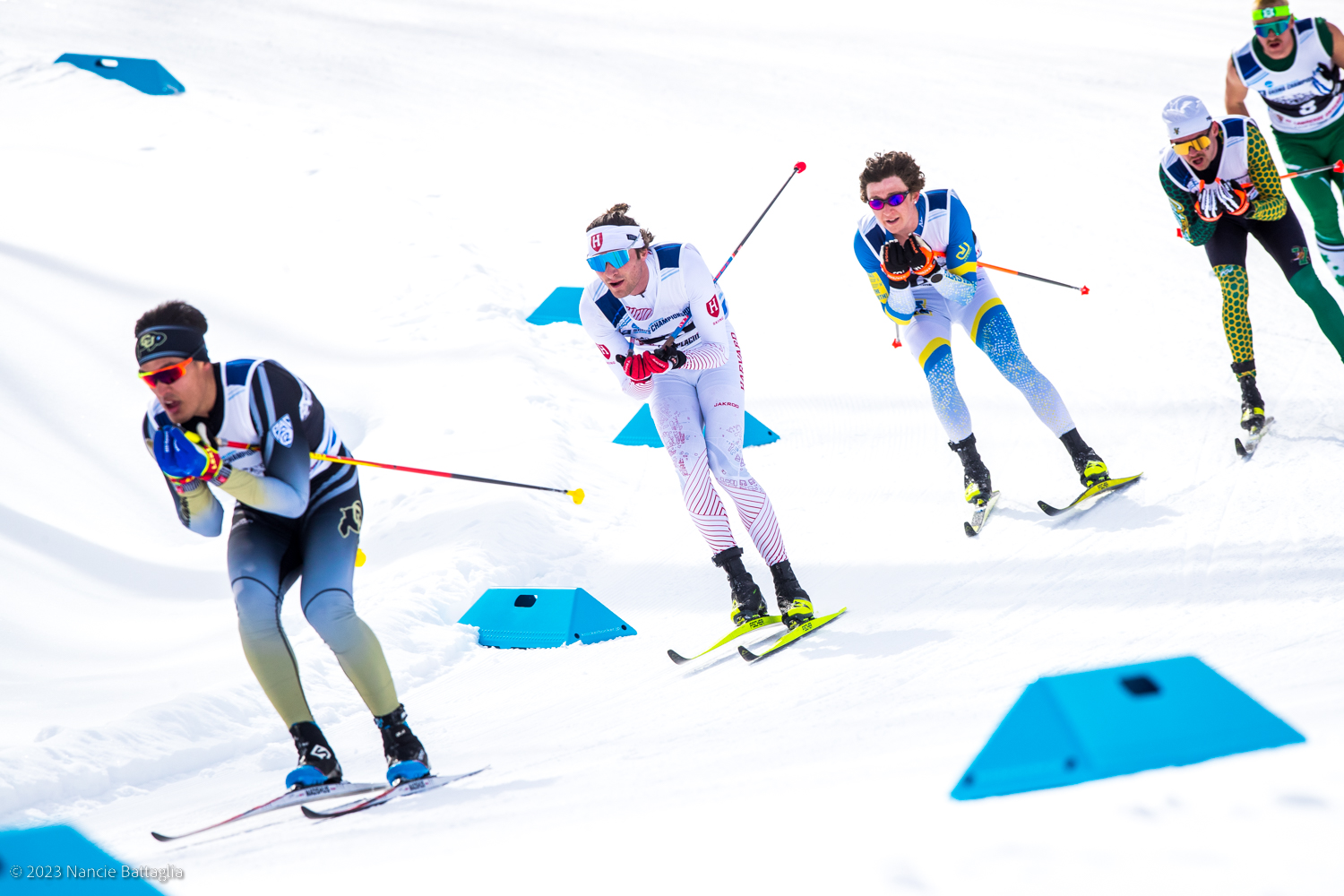
Others in the mix worth noting include University of Denver’s Florian Knopf who had a remarkably consistent season on the RMISA season prior having never finished outside the top five across skate, classic, distance, and sprint races. Leading the Central region will be Skylar Patten, a freshman from Michigan Tech, who recently swept the Central Regional Championships in a 7.5 k Freestyle and 20 k Classic race. There will also be plenty of sprint talent testing their limits as distance racers. That includes former US Nationals sprint winner Kristoffer Karsrud from Northern Michigan University. It also includes Colby College’s Jack Young, who is the only skier in the field—apart from top contenders Davies and Hagenbuch—with a top 30 on the World Cup this season. Young finished 23rd in the Canmore Classic Sprint in February.
In races filled with NCAA experience, the Men’s competitions promise to come down to who combines all the complex ski-race factors—skis, wax, fitness, course dynamics, and the ability to deal with Steamboat’s high altitude. Regardless, there will be many skiers eager to etch their names onto a great American ski tradition, the NCAA Championships at Howelsen Hill.
Ben Theyerl
Ben Theyerl was born into a family now three-generations into nordic ski racing in the US. He grew up skiing for Chippewa Valley Nordic in his native Eau Claire, Wisconsin, before spending four years racing for Colby College in Maine. He currently mixes writing and skiing while based out of Crested Butte, CO, where he coaches the best group of high schoolers one could hope to find.



